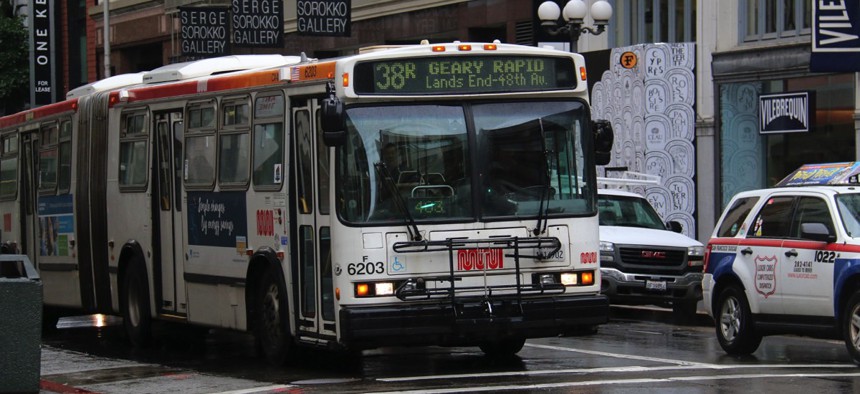San Francisco’s Really Expensive Parking Predicament


Connecting state and local government leaders
Also in our State and Local Daily Digest: Maryland’s new approach to bail; Louisiana’s struggles with swamp rats; and ditching coin-operated parking meters.
PUBLIC TRANSIT | Muni buses in San Francisco are running out of places to park. The San Francisco Municipal Transportation Agency says that if no new vehicle yards are built, then by 2025 it will have 55 more buses than it can park. By 2040, it’s expected that figure would grow to 120 buses and 46 light-rail vehicles. The agency says the estimated price to upgrade and expand transit vehicle parking facilities is $1.6 billion. [San Francisco Examiner]
ECONOMIC DEVELOPMENT | Denver has reached a five-year deal to host the Outdoor Retailer trade show, a major event that’s expected to draw about 45,000 attendees. The show had been held in Salt Lake City for about two decades. But there was a push within the outdoor recreation industry to move the twice-a-year gathering because of positions Utah public officials had taken on issues related to public lands. The final show in Salt Lake City will take place this month. It will move to Denver beginning in January 2018. [The Denver Post]
HOMELESSNESS | There’s growing concern about violence and other crime in the vicinity of Salt Lake City’s Rio Grande Street, near a homeless shelter. Over the July Fourth holiday a professional baseball player was attacked with a tire iron and, in a separate incident, a car hit a group of homeless people on a sidewalk, killing one of them. "The violence and what is going on there is escalating," Utah House Speaker Greg Hughes, a Republican, said. “When it gets that out of hand, you can have a discussion about the National Guard with a straight face.” Matt Clark is familiar with the area. "Everybody's trying to rob you," he said. "They steal bikes, phones, everything." [The Salt Lake Tribune]
LAW ENFORCEMENT | The state of Maryland is changing its approach to bail. A new policy that officially went into effect this month requires judges to consider a defendant’s ability to pay when setting bail and allows defense lawyer to challenge a judge’s decision to issue bail if the defendant cannot afford it. Although a couple of components of the rules change didn’t kick in until July, the policy has been unofficially in place since the fall, allowing advocates and critics to weigh in on whether or not the change is working. [The Washington Post]
Minnesota Gov. Mark Dayton is recommending that a $12 million law enforcement training fund be named for Philando Castile, the man shot and killed by a St. Anthony police officer last year. [Star Tribune]
HORSE RACING | The $35 million in winnings Suffolk Downs has handed out the last two years has come entirely from Massachusetts tax revenues and the casino tax in particular. Six-figure payouts go to winning horse owners via the Race Horse Development Fund, an attempt to attract the top thoroughbreds. But amid a $1 billion budget shortfall, some state senators want to take $13 million from the fund for environmental and recreation needs. [Boston Herald]
PARKING | Local officials in Delray Beach, Florida, are considering introducing smart parking meters for more than 3,000 downtown spaces, the latest city in South Florida that has or is looking at ditching coin-fed meters. [Sun Sentinel]
MONUMENTS | A statue of William Seward, the U.S. secretary of state who arranged the purchase of Alaska from Russia 150 years ago, has gone up outside the State Capitol in Juneau after four years of work. [Juneau Empire]
WILDLIFE MANAGEMENT | There’s some mixed news for Louisiana’s ongoing struggles with nutria, rodents sometimes called swamp rats, which have been eating up sensitive wetlands. “Even though the number of damaged sites increased, the area decreased," a Louisiana Department of Wildlife and Fisheries biologist said. "That was a surprise—a good surprise. We don't know why it's happening, but we'll take it." [The Times Picayune / NOLA.com]

NEXT STORY: Building a secure OS from the ground up




